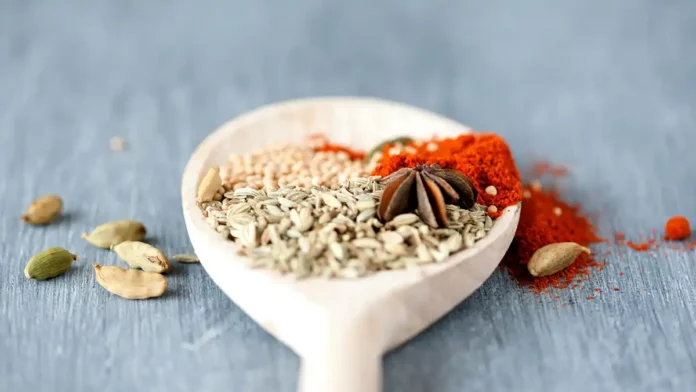
When it comes to the wider culinary arts scene, quality organic seasonings are workhorses which rarely receive the credit they deserve.
They don’t just add flavor—they transform meals into experiences.
As palates evolve and demand for clean eating rises, chefs and food enthusiasts alike seek out these natural enhancers.
What is it about these earth-born treasures that elevates a dish from ordinary to sublime?
Not only do they inject depth and complexity, but sourcing them sustainably can also align your kitchen practices with the ethos of health and environmental stewardship.
Let’s examine the mettle of high-quality organic seasonings in today’s kitchens and how to harness their potential in creating dishes that resonate with modern taste buds.
Table of Contents
The Alchemy of Flavor: Elevating Dishes with Organic Spice
Understanding the alchemy of organic seasonings begins by recognizing their superior pedigree. Unlike conventional spices, which may harbor residues from pesticides and synthetic fertilizers, organic options promise purity.
This difference isn’t merely academic; it translates directly to the taste, and is shaping consumer choices as a result.
Consider your last uninspired meal – could a pinch of rosemary or a dash of smoked paprika have shifted the narrative? Organic seasonings carry robust profiles that conventional counterparts often lack.
But beyond flavor, there’s texture too. A granular sea salt can offer a crunch that pre-ground table salt cannot match.
And let’s dive deeper into sustainability—a factor paramount for discerning consumers.
Sourcing seasonings from farms committed to organic practices supports biodiversity and soil health, creating a ripple effect on the larger ecosystem.
Embracing these natural powerhouses requires more than just sprinkling them onto finished plates.
It involves a thoughtful process where each seasoning is selected not only for its inherent characteristics but also for how it complements other ingredients, ensuring your culinary creations are nothing short of remarkable.
Unearthing Sources: The Quest for Prime Organic Seasonings
Procuring the finest organic seasonings is both an art and a science. It’s not merely about finding suppliers but building relationships with growers who share your vision for quality and sustainability.
This journey often takes you beyond the local farmer’s market to remote corners of the world where spices are native and their essence, unmatched.
So, where does one begin this quest? Start by researching dedicated organic spice merchants who prioritize direct trade.
These purveyors work closely with farmers, ensuring fair labor practices and authentic, high-grade products while also working to limit food waste as well.
Transparency in sourcing is key—you want to trace each clove and cinnamon stick back to its roots.
In some instances, your pursuit may inspire you to grow herbs on-site or collaborate with community gardens, marrying local production with global flavors.
This practice elevates your menu while rooting it in the community—something diners today deeply appreciate.
Tools like certification labels from USDA Organic or Fair Trade can be helpful guides on this journey.
However, nothing beats visiting suppliers when possible—seeing their operations firsthand and sampling spices at peak freshness ensures you’re getting the crème de la crème for your culinary endeavors.
Mastering the Craft: Strategic Spice Integration
The integration of organic seasonings into your culinary repertoire is a deliberate act of balance and creativity. It’s not just about having an arsenal of exotic spices; it’s about knowing when and how to deploy them for maximum impact.
Consider organic coarse Celtic sea salt, a seasoning that epitomizes the merging of health benefits and gourmet appeal.
Its mineral-rich grains offer more than just salinity; they bring a texture that can transform a simple tomato salad into an artisanal masterpiece or elevate chocolate in baked goods with a contrasting crunch.
To master this craft, start by experimenting with these seasonings in various stages of cooking—some spices bloom in oil, others unveil their magic when sprinkled atop finished dishes.
Organic dried herbs might blend seamlessly into slow-cooked stews, while fresh ones could best be reserved for garnishing, securing their vibrancy and aroma until the very last moment.
Incorporating these seasonings isn’t solely about following established recipes—it’s also about personal intuition. Engage your senses; taste as you go.
The bright zing of organic lemon zest or the subtle heat from crushed red pepper flakes can be adjusted to preference rather than precise measurement, allowing each chef to forge an individual path to flavor enlightenment.
A Tapestry of Taste: Crafting Unforgettable Menus
Creating a menu that tells a story with organic seasonings is akin to weaving a rich tapestry, each thread representing a different flavor, texture, and color.
It’s about constructing an experience that lingers on the palate and resides in the memory long after the meal concludes, as well as getting the fundamentals of menu engineering on point as well.
To construct such an experience, consider how the boldness or subtlety of each seasoning can create layers within your dishes.
Does the earthiness of organic turmeric provide a foundation for other flavors to dance upon? Can the elusive smokiness of organic chipotle add an unexpected twist to your barbecue sauce?
Reflect on these questions as you build your menu.
In crafting unforgettable menus, also contemplate how dietary preferences might intersect with global trends. Well-chosen organic spices can make plant-based dishes sing or offer depth without relying on traditional meat-based stocks.
They can ensure that gluten-free dining is not just safe but celebrated for its ingenuity.
Lastly, don’t forget about presentation—a sprinkle of vibrant herbs not only adds flavor but visual appeal that beckons diners to dive in.
Your menu should invite exploration and engage diners at every level: through its ethics, flavors, textures, and aesthetics—secured by your careful curation of top-notch organic seasonings.
It’s also worth touching on the idea that organic seasonings can augment and enhance menu items received from third parties.
So even if you’re taking advantage of a veggie-rich meal delivery service to save time in the evenings, having some responsibly sourced ingredients on hand to tweak the flavor to your preferences will be the cherry on the cake, so to speak.
Harvesting Health: The Nutritional Virtues of Organic Choices
The narrative surrounding organic seasonings is not just painted with the brush of superior flavor, but also with the vibrant hues of health benefits.
Each sprinkle and dash is an opportunity to enhance more than just taste—there’s a nutritional boon inherent in these natural choices.
When paired with varied diet-friendly meal recipes, the wellbeing benefits will be further amplified.
Organic spices and herbs are celebrated for their concentration of antioxidants, vitamins, and minerals. Choosing an organic route can mean a reduced intake of harmful chemicals that often come with conventionally grown produce.
Consider turmeric with its curcumin, known for having anti-inflammatory properties, or cinnamon which can regulate blood sugar levels.
Incorporating such ingredients thoughtfully into your menu caters to the ever-increasing health-conscious clientele.
A chef who infuses dishes with both panache and well-being in mind sends a message—a dedication to guests’ holistic dining experience.
It’s prudent practice to educate your staff about these health advantages; they’re invaluable assets when engaging with customers and highlighting the thoughtful composition of your dishes.
In this way, every meal served becomes not only a delight to the senses but also an ally to wellness—a testament to the harmony between culinary indulgence and healthy living.
Final Thoughts
In essence, organic seasonings offer a gateway to an elevated culinary narrative—one that weaves together flavor, sustainability, and wellness.
They are not just ingredients; they’re catalysts for change in the modern kitchen.
The decision to integrate these vibrant flavors into your offerings is a commitment to excellence and consciousness in dining. It’s a choice that speaks volumes about care for both the plate and the planet.
As you continue this journey, remember that each dish seasoned with intention can become a signature—a silent yet eloquent statement of your culinary philosophy.























